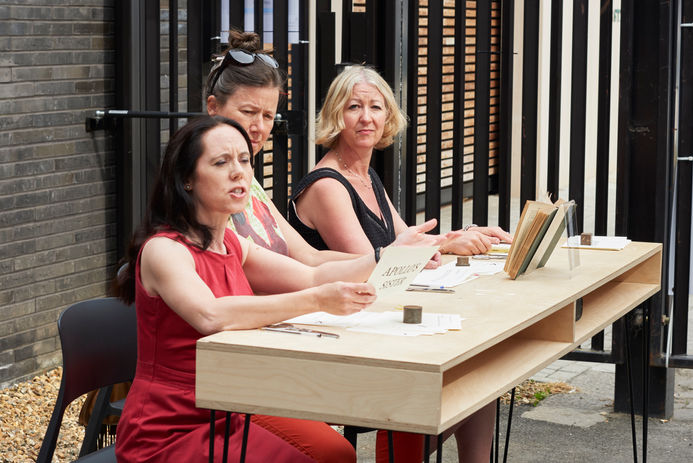The Furies, 2018.
Reharsal reading , 15 min.
with:
Carianne Dunford, Hermione Wiltshire, Jacqui Lofthouse
In Aeschylus’ Oresteia Orestes is convinced by god Apollo to kill his mother Clytemnestra. The murder is committed to revenge Orestes’ father, Agamemnon, who was assassinated by Clytemnestra, his wife, who was, in turn, revenging her daughter, killed by Agamemnon. Orestes faces two possible approaches on how his crime can be examined: personal retaliation, which would demand his execution, or an organized court, where thirteen judges, all male except the goddess Athena, are asked to evaluate matricide’s implications and to decide Orestes’ destiny. Within the trial, Apollo defends Orestes, while Clytemnestra is sustained by the Furies. At the end of dispute, judges’ votes are tied. Athena’s vote will be decisive in releasing Orestes. The reason being, she was born from her father. In the myth, Zeus gives birth to Athena from his head. It derives that no mother has parental blood links with her children. Thus given, reasons for personal revenge are less pressing and Clytemnestra is increasingly guiltier. Orestes’ crime is clear from blood relations: killing the mother is not so blameworthy, especially if one does it to celebrate the father. Indirectly, Clytemnestra loses her right to revenge her daughter, since Agamemnon is the only one who oversaw her life. In addition, deals and agreements increase power over blood ties, thus making to break the spousal agreement - by killing the husband - guiltier than killing a daughter. At the end, the mother is plundered of her function of nursing and caring. She is despoiled of any parental capability. Orestes is released. From now on, there will be organized trials and no more retaliations. This text is vastly individuated as the first trial in western history, the setting stone of democracy. Can a democracy exist while not in denial with the maternal role and with children’s education and spring? What price society must pay to live in a – patriarchal- democracy?
The reharsal reading aims at questioning Aeschilus text by editing it, giving voice to an invented characted who can stand against Apollo and by exchanging lines amongst characters. Editing, and charachters are visualized throught actors’ actions and cards. The actresses are all mothers.
Nell'Oresteia di Eschilo Oreste è convinto dal dio Apollo a uccidere sua madre Clitennestra. L'omicidio è commesso per vendicare il padre di Oreste, Agamennone, assassinato da Clitennestra, sua moglie, che a sua volta vendicava sua figlia, uccisa da Agamennone. Oreste affronta due possibili approcci su come esaminare il suo crimine: ritorsione personale, che richiederebbe la sua esecuzione, o un tribunale organizzato, dove tredici giudici, tutti maschi tranne la dea Atena, sono invitati a valutare le implicazioni del matricidio e a decidere il destino di Oreste . All'interno del processo, Apollo difende Oreste, mentre Clitennestra è sostenuta dalle Furie. Alla fine della controversia, i voti dei giudici sono pari. Il voto di Atena sarà decisivo per il rilascio di Oreste. Il motivo è che è nata da suo padre. Nel mito, Zeus dà alla luce Atena dalla sua testa. Ne deriva che nessuna madre ha legami genitoriali con i suoi figli. Dette così, le ragioni della vendetta personale sono meno pressanti e Clitennestra è sempre più colpevole. Il crimine di Oreste è chiaro dai parenti di sangue: uccidere la madre non è così biasimevole, soprattutto se lo si fa per celebrare il padre. Indirettamente, Clitennestra perde il diritto di vendicare sua figlia, poiché Agamennone è l'unico che ha supervisionato la sua vita. Inoltre, gli accordi e gli accordi aumentano il potere sui legami di sangue, rendendo così la rottura del patto coniugale - uccidendo il marito - più colpevole dell'uccisione di una figlia. Alla fine, la madre viene depredata della sua funzione di infermiera e di cura. È spogliata di ogni capacità genitoriale. Oreste viene rilasciato. D'ora in poi ci saranno processi organizzati e non più ritorsioni. Questo testo è ampiamente individuato come il primo processo nella storia occidentale, la pietra angolare della democrazia. Può esistere una democrazia senza negare il ruolo materno, l'educazione e la primavera dei bambini? Quale prezzo deve pagare la società per vivere in una democrazia patriarcale? La lettura della prova mira a mettere in discussione il testo di Eschilo modificandolo, dando voce a un personaggio inventato che può opporsi ad Apollo e scambiando battute tra i personaggi. Le modifiche e i personaggi vengono visualizzati attraverso le azioni e le carte degli attori. Le attrici sono tutte madri.












